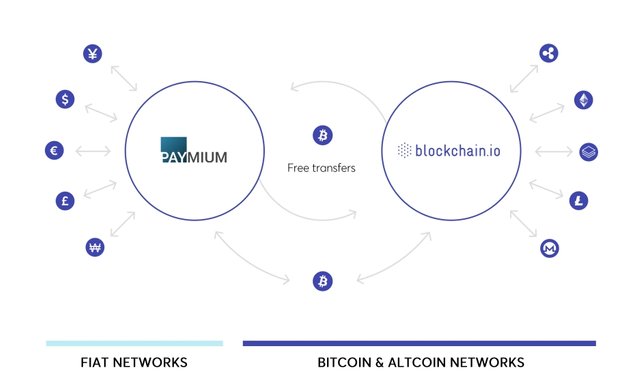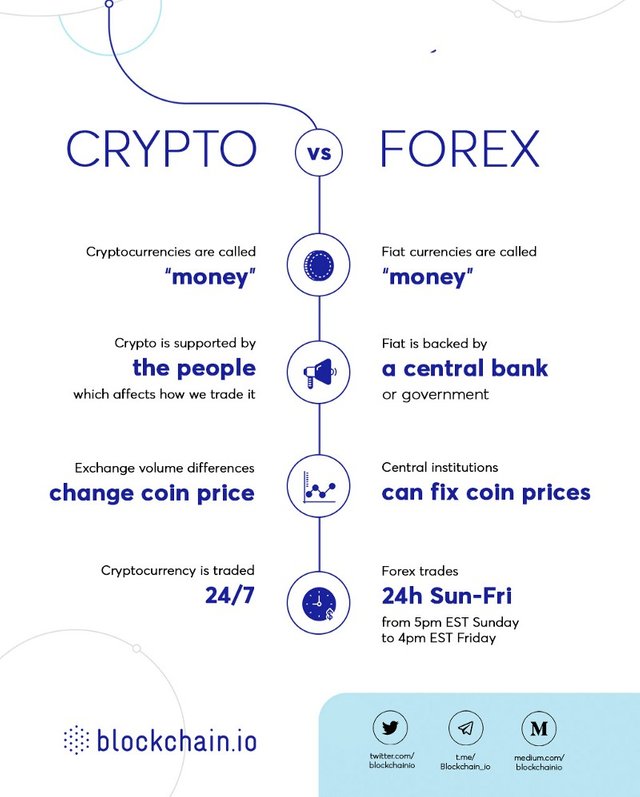
Before we will answer this question, let just take a look at this issue from a more general perspective: what is the cryptocurrency exchange?
As in the case of shares or commodities, the vast majority of trading on the cryptocurrency market takes place through stock exchanges. However, they do not have a physical trading place - they are virtual and completely decentralized (just like in the case of the forex market). Moreover, exchanges provide access to a range of key market information - the value of individual virtual coins, valuation, trends, volumes and the like.
Crypto exchanges are extremely important for any virtual currency investor, regardless of their level of advancement. They are created in such a way as to meet the needs of the unique, dual industry characteristics. They are tailored to the expectations of traders with experience and knowledge from traditional markets and to beginner investors who have never invested in a traditional stock market.
Buying and selling of cryptocurrencies directly on the stock exchange
On the cryptocurrency exchanges, we can use two basic methods of buying and selling coins. The first of them is a direct purchase from the exchange itself - in this case, no other investor is involved in the transaction. The whole works on a very simple principle - a physical currency is transferred from your bank account and exchanged into virtual currencies according to their current valuation. However, it should be remembered that by purchasing digital coins directly from the stock market owners, the transaction will be charged with additional handling fees.
The second method is the one in which the exchange only plays the role of an intermediary. It becomes a platform that allows buyers and sellers to meet and exchange transactions take place between them. Offers can be submitted in the form of an auction or direct order - we will inform you how many coins we want to buy/sell and at what price. Many investors prefer this solution, because the role of the exchange is limited here and additional fees either do not occur or are very small.
Of course, an exchange itself is not needed to interchange cryptocurrencies. We can find potential buyers/sellers by ourselves. In this case - without the exchange arbitrage - however, the risk that we will be cheated increases.
Independent cryptocurrency valuations
If you've ever followed Bitcoin's course, you've probably noticed that for individual exchanges, the difference between quotations can be as much as several percents. This is due to the fact that cryptocurrencies as completely decentralized forms of payment do not have an overarching regulatory authority. Each stock exchange independently determines the BTC exchange rate based on the market situation and the demand and supply forces taking place in its own structures. While the prices of individual exchanges tend to correlate strongly with each other, the differences are often noticeable - especially in the case of less popular coins characterized by the highest volatility.
Crypto and Currency exchanges main differences
In the beginning, I should mention the most important difference between crypto and the currency market. Cryptocurrency market is independent of all governments or institutions (decentralization), while the main participants of the currency market are central and commercial banks. Nevertheless, the newly emerged Blockchain.io exchange is aspiring to change this situation.

It looks like a day trading on the cryptocurrency market might seem too risky due to the high volatility of the main cryptocurrencies like Bitcoin or Ethereum, but Bitcoin works quite differently. I'll explain this in the following example.
Transfers in fiat currencies depend on banking sessions, and the risk of exchange rate changes is almost negligible, due to high price stability. If we order a funds transfer on a Friday evening, the money on your account will only be on Monday morning. In the case of Bitcoin, if the transfer was ordered on Friday evening and received on Monday, the difference could be significant plus or minus. Bitcoin, thanks to decentralization and network power, can be delivered immediately, which is why payment processors have been created that allow contractors to convert funds live. Thanks to them, the time barrier does not matter, and transfers arrive immediately in the currency the seller has chosen.
Liquidity ratios
The main difference between Bitcoin and the forex market is actually the liquidity ratios. Forex is the largest and most liquid market in the world, where the average value of daily turnover can be billions of dollars. Bitcoin is a younger and smaller market with a value of approximately USD 107 billion (data from June 2018).
Liquidity is the degree to which the market allows you to buy and sell assets at fixed prices. The higher the liquidity, the more stable the market is, and the prices do not fluctuate significantly. If during the day there is a transaction worth one million dollars, the market is able to absorb this transaction easily, without a significant change in the value of the dollar. In the case of Bitcoin, the same transaction may have a much larger impact on the value of the digital currency due to relatively small volumes. In order for prices to be stable, the demand for Bitcoin must be consistent with the level of inflation. This model of crypto-fiat exchange has been accepted widely in the industry, but Blockchain.io exchange will change this situation in a favor of more transparent, liquid and secure trading environment by creating a hybrid model between centralized and decentralized exchanges.
The operation of the cryptocurrency exchange vs the forex market
The cryptocurrency exchange operates 7 days a week for 24 hours. On the other hand, the forex market is open 24 hours from Monday to Friday. During the weekend, however, it rests - as well as during major holidays. This is important information for investors, due to the fact that the market at such times may behave irrationally and it is difficult then to enter into speculative transactions.
The opening of the forex market 24 hours a day, 5 days a week is both a plus as well as a considerable challenge for investors due to the lack of opportunities to participate in their lives at all times. In the case of the cryptocurrency exchange, its decisive advantage is opening in the 24/7 system, due to the decentralization and lack of digital currency regulation, which means that we do not need financial institutions such as banks to exchange them. Stock exchanges automatically connect sellers with investors at any time of the day or night.
Factors affecting the exchange rate
Due to the limited amount of Bitcoin on the market and its low liquidity (due to the freshness of this market, which has the largest increase at this point), its purchase at a favorable price for us may take slightly longer than in the case of fiat currencies (e.g. USD, EUR). If someone wants to buy Bitcoin quickly, it will issue a purchase order for a higher price than other pending orders. In this way, the price of the digital currency increases. On the other hand, it falls when the seller lowers the price dynamically or successively.
On the other hand, various events (political, social, economic, etc.) may affect the behavior of exchange rates available on the forex market. The greatest impact on the high volatility of this market are publications of macroeconomic data such as GDP growth, monetary policy and central bank reports. The market volatility is therefore much more dynamic here than in the case of Bitcoin and other cryptocurrencies offered by crypto exchanges.

In conclusion - the main differences between cryptocurrency and the currency markets are factors affecting the value of exchange rates, liquidity factors affecting market stability, opening hours, and the fact that cryptocurrency market is several or several dozen times more dynamic, ideal for day trading as well as for long-term investments due to the deflationary nature of this any cryptocurrency.

Currency exchanges and cryptocurrency exchanges both facilitate the exchange of value, yet they operate in distinct realms with unique characteristics. Traditional currency exchanges typically deal with fiat money—government-issued currencies like dollars, euros, or yen. They focus on converting one form of legal tender into another, catering to travelers, businesses, and traders engaging in international commerce. These exchanges are subject to strict regulations, central banking oversight, and anti-money laundering (AML) laws, ensuring a relatively stable environment for transactions.
Cryptocurrency exchanges, on the other hand, are platforms where digital assets like Bitcoin, Ethereum, and others are bought, sold, or traded. Unlike their fiat counterparts, these exchanges operate in a decentralized space, with varying levels of regulation depending on the jurisdiction. This lack of uniform oversight can lead to greater volatility, but it also provides unique opportunities for innovation and growth. Trading on crypto exchanges involves a higher degree of risk due to market fluctuations, security concerns, and potential regulatory changes. To navigate this environment, traders must implement robust risk management strategies. Resources like https://pantheonuk.org/how-to-properly-manage-risks-in-crypto-exchange-trading/ offer insights into these risks, emphasizing the importance of thorough research and cautious trading practices. Thus, while both types of exchanges facilitate value transfer, their operational dynamics, regulatory frameworks, and risk profiles differ
Downvoting a post can decrease pending rewards and make it less visible. Common reasons:
Submit
Exploring the nuances between currency and cryptocurrency exchanges has been quite fascinating for me.
Downvoting a post can decrease pending rewards and make it less visible. Common reasons:
Submit
Cryptocurrency exchanges, with their decentralized nature, offer a dynamic trading environment unlike traditional currency markets tied to central banks. As I've immersed myself further into this realm, I recently came across one intriguing AI trading tool. It piqued my interest as a potential game-changer in the trading landscape, promising to enhance trading experiences with its innovative features. If you're open to exploring new avenues for trading, you might find it worthwhile to check out at https://immediateedgeapp.org/. It's always exciting to stumble upon tools that have the potential to reshape how we approach trading and investment.
Downvoting a post can decrease pending rewards and make it less visible. Common reasons:
Submit